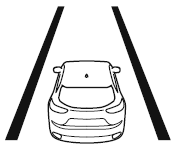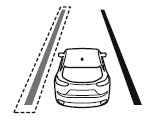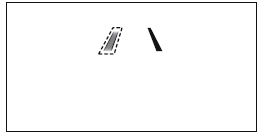The LAS & LDWS alerts the driver that the vehicle may be deviating from its
lane and it
provides steering assistance to help the driver stay within the vehicle lanes.
The Forward Sensing Camera (FSC) detects the white lines (yellow lines) of the
vehicle
lane in which the vehicle is traveling and if the system determines that the
vehicle may
deviate from its lane, it operates the electric power steering to assist the
driver's steering
operation. The system also alerts the driver by activating a lane departure
warning sound,
vibrating the steering wheel, and indicating an alert in the display. Use the
system when you
drive the vehicle on roads with white (yellow) lines such as expressways and
highways.
Refer to Forward Sensing Camera (FSC).

WARNING
Do not rely completely on the LAS & LDWS:
- The LAS & LDWS is not an automatic driving system. In addition, the
system is not designed
to compensate for a driver's lack of caution, and over-reliance on the
system could lead to
an accident.
- The detection ability of the LAS & LDWS is limited. Always stay on
course using the steering
wheel and drive with care.
Do not use the LAS & LDWS in the following cases:
The system may not operate adequately according to the actual driving
conditions, resulting
in an accident.
- Driving on roads with tight curves.
- Driving under bad weather conditions (rain, fog, and snow).
- Slippery roads such as ice or snow-bound roads.
- Roads with heavy traffic and insufficient distance between vehicles.
- Roads with no white (yellow) lane lines.
- Narrow roads resulting from road construction or lane closures.
- The vehicle is driven on a temporary lane or section with a closed
lane resulting from road
construction where there may be multiple white (yellow) lane lines or they
are interrupted.
- Vehicle is driven on roads other than expressways and highways.
- The tire pressures are not adjusted to the specified pressure.
- Tires of a different specified size are used, such as an emergency
spare tire.
CAUTION
Heed the following cautions so that the LAS & LDWS can operate normally.
- Do not modify the suspensions.
- Always use wheels of the specified type and size for the front and
rear wheels. Consult an
Authorized Mazda Dealer for tire replacement.
NOTE
- When the turn signal lever is operated for a lane change, the LAS &
LDWS is
automatically disabled. The LAS & LDWS becomes operational again when the
turn
signal lever is returned and the system detects white (yellow) lane lines
while the vehicle
is being driven normally within its vehicle lane.
- If the steering wheel, accelerator pedal, or brake pedal is operated
abruptly and the
vehicle moves close to a white (yellow) line, the system determines that the
driver is
making a lane change and the LAS & LDWS operation is temporarily canceled.
The LAS
& LDWS becomes operational again when the system detects white (yellow) lane
lines
while the vehicle is being driven normally within its vehicle lane.
- If the vehicle deviates from its lane repeatedly within a short
period of time, the LAS &
LDWS may not operate.
- When white (yellow) lane lines are not detected, the LAS & LDWS does
not operate.
- Under the following conditions, the LAS & LDWS may not be able to
detect white (yellow)
lane lines correctly and it may not operate normally.
- If an object placed on the dashboard is reflected in the
windshield and picked up by the
camera.
- Heavy luggage is loaded in the luggage compartment or on the rear
seat and the
vehicle is tilted.
- The tire pressures are not adjusted to the specified pressure.
- Tires other than conventional tires are equipped.
- Vehicle is driven on an intersection or junction, or on a forked
road.
- The white (yellow) lane lines are less visible because of dirt or
fading/patchiness.
- A vehicle in front of your vehicle is running near a white
(yellow) lane line making it
less visible.
- A white (yellow) lane line is less visible because of bad weather
(rain, fog, or snow).
- The vehicle is driven on a temporary lane or section with a
closed lane resulting from
construction where there may be multiple white (yellow) lane lines or
they are
interrupted.
- A misleading line is picked up on the road such as a temporary
line for construction, or
because of shade, lingering snow, or grooves filled with water.
- The surrounding brightness suddenly changes such as when entering
or exiting a
tunnel.
- The illumination of the headlights is weakened because of dirt or
the optical axis is
deviated.
- The windshield is dirty or foggy.
- The windshield, camera is fogged (water droplets).
- Back-light is reflected off the road surface.
- The road surface is wet and shiny after rain, or there are
puddles on the road.
- The shade of a guardrail parallel to a white (yellow) lane line
is cast on the road.
- The width of the driving lane is narrow or wide.
- Driving on roads with tight curves.
- The road is excessively uneven.
- The vehicle is shaken after hitting a road bump.
- There are 2 or more adjacent white (yellow) lane lines.
- There are various road markings or lane markings of various
shapes near an
intersection.
System Operation
Make sure that the LAS & LDWS OFF
switch indicator light is turned off. When
the LAS & LDWS OFF switch indicator
light is turned on, press the switch and
make sure that the switch indicator light
turns off.

The LAS & LDWS indication (gray) is
displayed in the multi-information display,
and the system goes on stand-by.

Drive the vehicle in the center of the
vehicle lane while the system is on
standby. When all of the following
conditions are met, the LAS & LDWS
indication (white) is displayed in the
multi-information display, and the system
becomes operational.

- The engine is running.
- The vehicle speed is about 60 km/h (37
mph) or faster.
- The system detects white (yellow) lane
lines on both the right and left sides.
- The driver is operating the steering
wheel.
- The driving lane is neither narrow nor
wide.
NOTE
The LAS & LDWS indication is gray when
the system detects only a white (yellow)
line on either the left or right, and the
indication changes to white when the
system detects white (yellow) lines on both
the left and right sides.

The LAS & LDWS goes on stand-by
status in the following cases:
NOTE
- The LAS & LDWS does not operate until
the system detects white (yellow) lane
lines on either the left or right.
- When the system detects a white
(yellow) lane line on one side only, the
system will not operate the steering
wheel operation assist and the warning
for the lane line on the side that is not
being detected. The steering wheel
operation assist and the warning is only
for a lane deviation on the side that is
being detected.
- If the driver takes his or her hands off
the steering wheel (not holding the
steering wheel), the warning sound is
activated and an alert is indicated in the
multi-information display or the active
driving display.

If the steering wheel is held lightly, or
depending on the road conditions, the
system may detect that you have
released the steering wheel (not holding
the steering wheel) even if you are
holding it, and display a message in the
multi-information display or the active
driving display.
- The timing at which the lane departure
warning is activated and the steering
wheel operation assist is performed
varies.
- The following settings for the LAS &
LDWS can be changed.
- Steering operation assist operational/
non-operational
- Cancel sensitivity (likelihood of
steering assist)
Vehicle lane line display
When the LAS & LDWS becomes
operational while on standby, the vehicle
lane lines are displayed in the
multi-information display and the active
driving display. In the vehicle lane lines
display indicating the operation status, the
color of the vehicle lane lines being
detected changes to white.
(Stand-by status)

(Operational status)

Auto cancel
In the following cases, the LAS & LDWS
is automatically canceled, the LAS &
LDWS warning indication (amber) turns
on, and an alert is displayed. When the
LAS & LDWS become operational, the
system turns back on automatically.
- The temperature inside the camera is
high or low.
- The windshield around the camera is
foggy.
- The windshield around the camera is
blocked by an obstruction, causing poor
forward visibility.
Auto cancel of warning/steering assist
When the following operations are
performed, the LAS & LDWS operation is
canceled automatically. The LAS &
LDWS resumes automatically after the
operation.
NOTE
Steering operation assist OFF
(non-operational)
The steering operation assist for the LAS
& LDWS can be changed to
non-operational (OFF).
When the steering operation assist has
been changed to inoperable (OFF), only
the lane departure warning is operational.
System operation
Make sure that the LAS & LDWS OFF
switch indicator light is turned off. When
the LAS & LDWS OFF switch indicator
light turns on, press the switch and make
sure that the switch indicator light turns
off.

Drive the vehicle in the center of the
driving lane while the LAS & LDWS OFF
switch indicator light is turned off.
The system becomes operational when all
of the following conditions are met.
- The system detects white (yellow) lane
lines on both the right and left sides or
on either side.
- The vehicle speed is about 60 km/h (37
mph) or faster.
- The vehicle is driven on a straight road
or road with gentle curves.
- The engine is running.
The LAS & LDWS goes on stand-by
status in the following cases:
- The system cannot detect white (yellow)
lane lines.
- The vehicle speed is less than about 60
km/h (37 mph).
- The vehicle is making a sharp curve.
- The vehicle is making a curve at an
inappropriate speed.
NOTE
- The LAS & LDWS remains on stand-by
until it detects white (yellow) lines on
both the left and right sides, or on either
side.
- When the system detects a white
(yellow) lane line on one side only, the
system will not activate warnings for the
lane line on the side that is not being
detected.
- The distance and warning sensitivity
(likelihood of a warning) which the
system uses to determine the possibility
of a lane departure can be changed.
Vehicle lane line display
When the LAS & LDWS becomes
operational while on standby, the vehicle
lane lines are displayed in the
multi-information display. The system
changes to operational status display when
the system detects a white (yellow) line on
either the left or right.
(Stand-by status)

(Operational status)

Auto cancel
In the following cases, the LAS & LDWS
is automatically canceled, the LAS &
LDWS warning indication (amber) turns
on, and an alert is displayed. When the
LAS & LDWS become operational, the
system turns back on automatically.
- The temperature inside the camera is
high or low.
- The windshield around the camera is
foggy.
- The windshield around the camera is
blocked by an obstruction, causing poor
forward visibility.
(Auto cancel of warnings)
When the following operations are
performed, the LAS & LDWS determines
that the driver intends to make a lane
change and the system operation is
canceled automatically. The LAS &
LDWS resumes automatically after the
operation.
System Canceling
When the LAS & LDWS is turned off,
press the LAS & LDWS OFF switch.

The LAS & LDWS OFF switch indicator
light turns on.
NOTE
- In the following cases, the LAS & LDWS
is canceled automatically and the LAS
& LDWS OFF indication is displayed in
the multi-information display. Have your
vehicle inspected at an Authorized
Mazda Dealer.
- There is a malfunction in the power
steering.
- There is a malfunction in the TCS.
- There is a malfunction in the Forward
Sensing Camera (FSC).
- When the ignition is switched OFF, the
system status before it was turned off is
maintained. For example, if the ignition
is switched OFF with the lane-keep
system operable, the system will be
operable when the ignition is switched
ON the next time.
When the LAS & LDWS is turned off, the
vehicle lane line indication in the
multi-information display and the active
driving display turn off.
Lane Departure Warning
If the system determines that the vehicle may deviate from its lane, the lane
departure
warning (beep sound, rumble sound*1, or steering wheel vibration) is activated
and the
direction in which the system determines that the vehicle may deviate is
indicated in the
multi-information display and the active driving display.
If the system determines that the vehicle may deviate from its lane, the color
of the lane line
on the side being detected by the system changes from white to amber, and
flashes.
Multi-information Display

Active Driving Display

NOTE
- If you have set the lane departure warning sound to the beep
sound/rumble sound*1
setting, the warning sound may not be heard depending on the surrounding
noise
conditions.
- If you have set the lane departure warning system to the steering
wheel vibrations setting,
the vibration may not be felt depending on the road surface conditions.
- When the setting for the steering operation assist is changed to
operational, the warnings
can be set to activate/not activate. (When the setting for the steering
operation assist is
changed to non-operational, the warnings cannot be set to not activate.)
- The LAS & LDWS can be changed to the following settings regardless of
whether the
steering operation assist has been set to operational/non-operational.
Always check the
setting status when driving the vehicle and make setting changes if
necessary.
- Steering wheel vibration: Strong/weak
- Warning sound volume
- Types of warnings (steering wheel vibration/beep sound/rumble
sound*1)
*1 A rumble strip is a series of grooves in the road pavement surface
positioned at specific
intervals, and when the vehicle passes over it a vibration and rumble sound is
produced
which alerts the driver that the vehicle is departing from the lane.
The rumble sound is a reproduction of the sound which occurs when a
vehicle passes
over a rumble strip.

| 
















